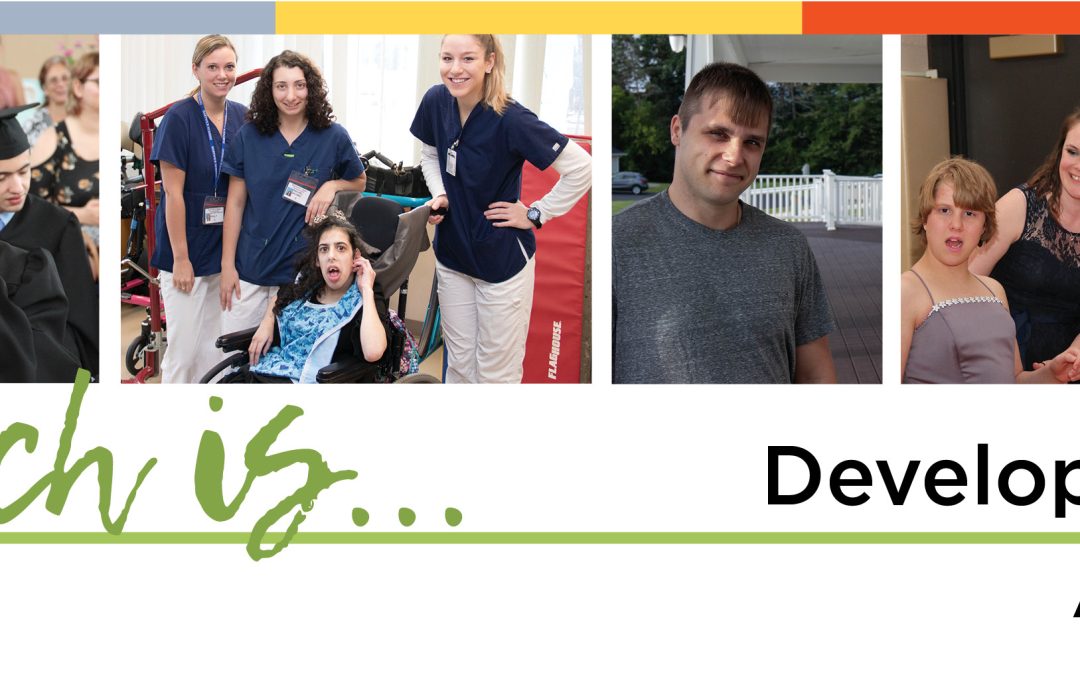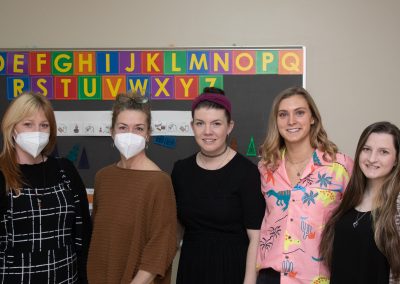March is Developmental Disabilities Awareness Month and throughout the month we’ll be highlighting various aspects of developmental disabilities, what you can do to advocate for yourself, a friend, or a family member with a disability, and how you can promote disability education and awareness.

According to the CDC, “Developmental disabilities occur among all racial, ethnic, and socioeconomic groups. Recent estimates in the United States show that about one in six, or about 17%, of children aged 3 through 17 years have one or more developmental disabilities, such as: ADHD, autism spectrum disorder, cerebral palsy, hearing loss, intellectual disability, learning disability, vision impairment, and other developmental delays.” [1]
Early intervention is important for many developmental disabilities – with early intervention a person can learn to manage their life and overcome every day challenges. Moreover, persons with a disability, and their loved ones, can learn to advocate for disability rights throughout their lifetime. This is why it is important to share stories, advocate, and educate yourself and others about developmental disabilities throughout the month of March and beyond. We’ll be highlighting some of the resources available to all people throughout the month. In the meantime, you can find more information at the National Association of Councils on Developmental Disabilities website [nacdd.org] [2] and at our advocacy page. Please like and share this post and use the hashtags below to join in the conversation!
March 1
Each year during Developmental Disabilities Awareness month we celebrate International Wheelchair Day to honor the positive influence wheelchairs have for people with disabilities. We also acknowledge the incredible things wheelchairs users accomplish every day. It is a day to raise awareness about the fact that there are millions of people who need wheelchairs but do not have access to one. It’s also an opportunity to give appreciation to the caregivers and loved ones who support wheelchair users in so many ways.
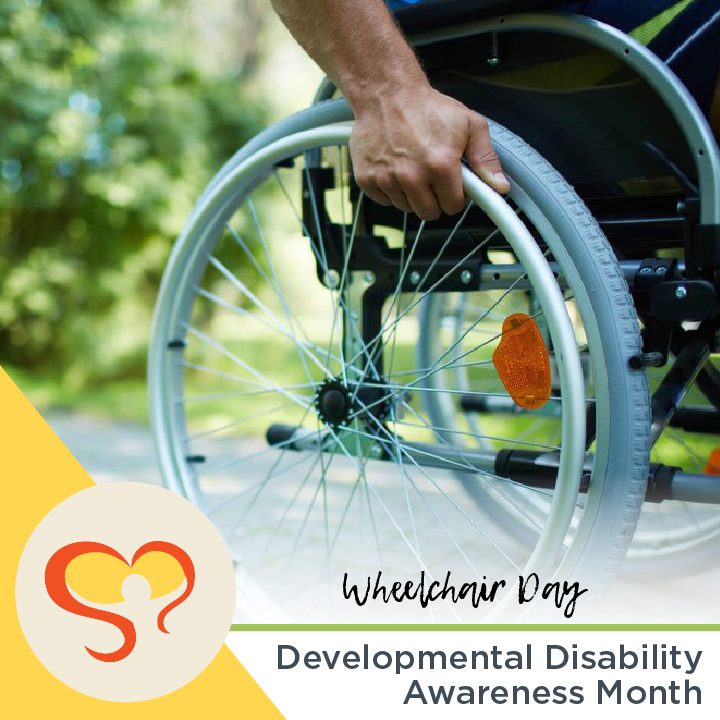
March 2
In addition to being Developmental Disabilities Awareness Month, March is also Cerebral Palsy Awareness Month. Cerebral Palsy affects the developing brain and causes varying degrees and types of disabilities to a person’s motor functions. Most often, it affects motor movement and posture. Physical, occupational, and speech therapy are used to help a person stretch and gain strength, and improve their overall quality of life.
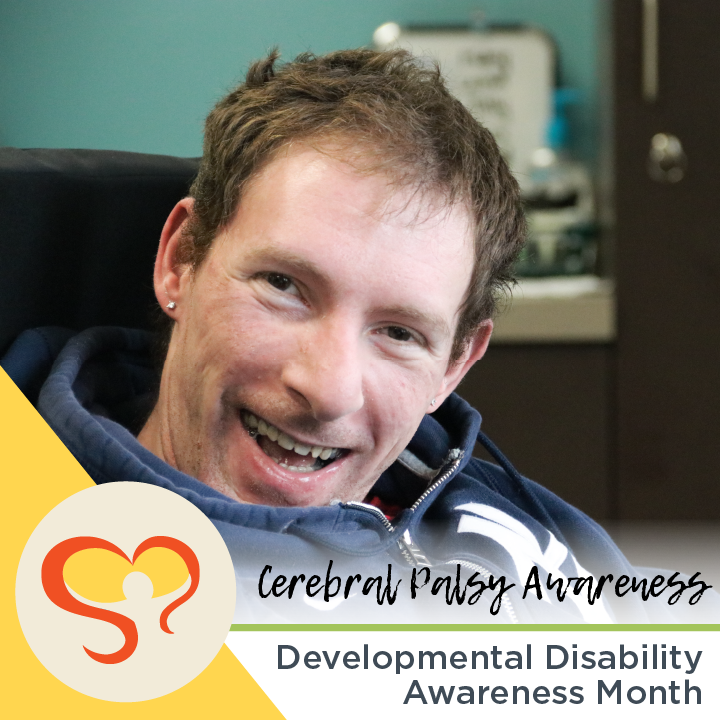
Medications are sometimes used to improve symptoms. No two people with cerebral palsy will experience it in the same way, thus it is important to be aware of a person’s abilities as they vary from one person to the next.
The Cerebral Palsy Alliance Research Foundation offers information and resources for those with CP, as well as family, friends, advocates and allies, and ideas on how you can support CP Awareness Month!

March 4
As well as being Developmental Disabilities Awareness month it is also Multiple Sclerosis Awareness month. Multiple sclerosis (MS) is a chronic condition that attacks the central nervous system, e.g. the spinal cord, brain, and optic nerves. This causes inflammation, scar tissue or lesions, and can make it hard for the brain to send signals to the rest of the body. There are
4 different forms of MS, each ranging from mild – severe; symptoms are diverse, and may come and go in phases, or get steadily worse over time. Most people are diagnosed between the ages of 20 – 40, and women are twice as likely to get MS than men. Approx. 2.5 million people have MS worldwide & there’s no known cure, yet.
March 5
Did You Know?
There are four main types of developmental disorders: nervous system disabilities, sensory related disabilities, metabolic disabilities, and degenerative disorders. Many different subsets of disabilities nest under these four main groups. The greater the understanding of these disorders, the better the treatment and services that can be provided in the future.
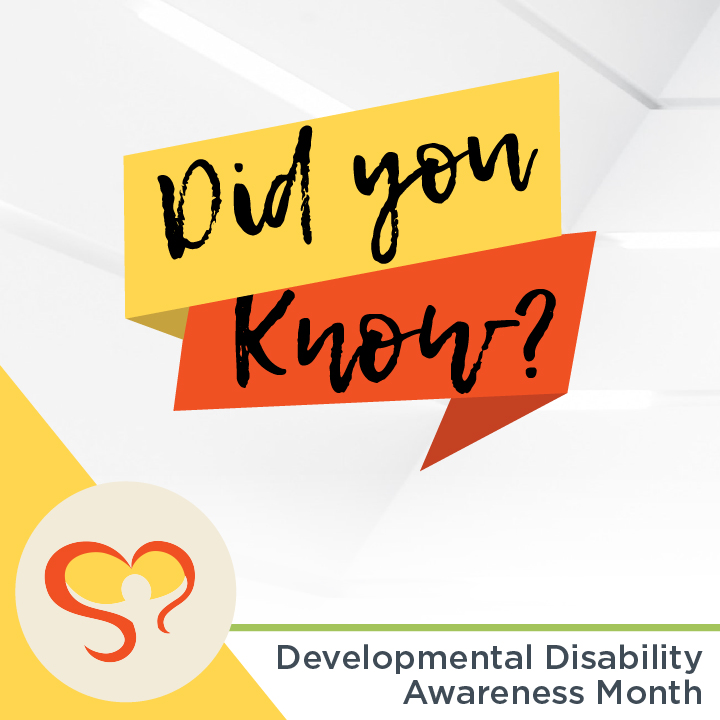
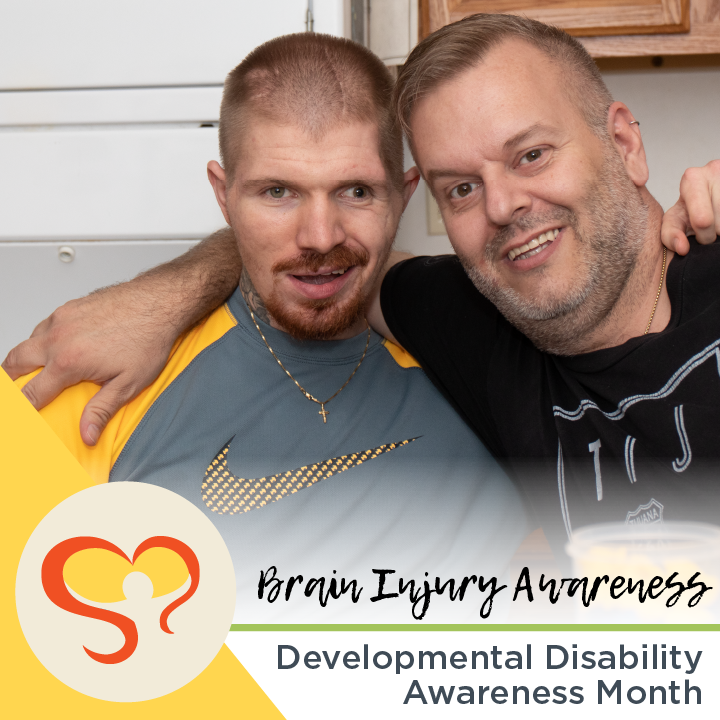
March 7
March 13 – 19th is Patient Safety Awareness Week! This is an annual recognition event intended to encourage everyone to learn more about health care safety. This important awareness campaign coincides with March also being Brain Injury Awareness Month and Developmental Disabilities Awareness Month. Springbrook’s mission is intertwined in these hugely important causes, and we strongly encourage advocacy on their behalf.
We recently sat down for an interview with Brandon Jones, and his family. At 19 years old, Brandon was involved in a horrific car accident that left him with a traumatic brain injury (TBI). Brandon was in the prime of his life. He had a two-year-old daughter, and being that he was in peak physical condition, this was a dramatic reset to his future. Brandon’s condition has left him needing medical care every day for the rest of his life, so health care safety is paramount in improving his condition. Read on below about the journey of Brandon and his family and learn how perseverance and determination can save and improve a life.
March is such an important month for people with disabilities, their families, and advocates. It’s a time to share stories, educate oneself and others, and spread awareness. Read more above about what makes March an important awareness month and learn ways that you can help during this month-long awareness campaign.
March 8
Today is International Women’s Day! Did you know that Judith Heumann, who contracted Polio at age two, remains one of the most influential disability rights advocates today? Born in New York in 1947, Heumann has been integral to the fight for disability rights since the 1970s when she fought the New York Board of Education for her teaching license and became the first teacher using a wheelchair in this state. You can read more about her at the link below!

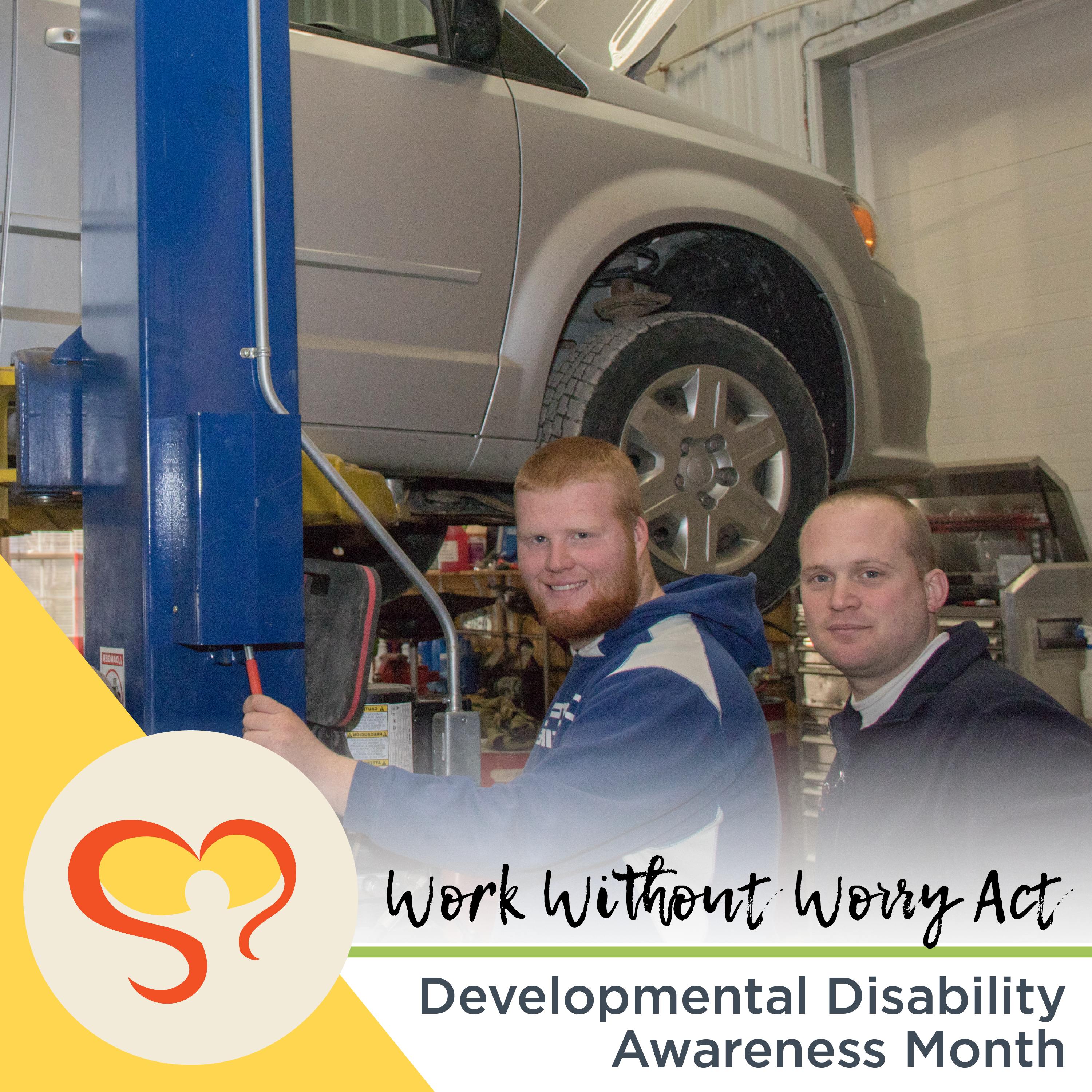
March 9
This WellnessWednesday we bring you the opportunity to take action for the wellness of those with disabilities by ensuring their access to work and secure benefits. The Work Without Worry Act would allow Americans with disabilities to take on employment opportunities without losing social security benefits, known as disabled adult child (DAC) benefits. Currently, individuals with disabilities may lose DAC benefits if they begin working and earn more than the specified income.
The Work Without Worry Act would guarantee that individuals with disabilities have the same opportunities to work and take care of their daily needs without losing their eligibility for DAC benefits. At Springbrook, we support 43 people who are employed in their communities. We also have a community pre-vocational skill-building program through OPWDD that supports 21 individuals, through community-based assessments to gain the skills needed to obtain community employment in the future. Please take action at the website below and help people keep their benefits.
After sending this pre-filled form to your representatives, visit our Advocacy page and learn other ways that you can advocate for individuals with developmental disabilities!
March 11
March is not only Developmental Disability Awareness month but it is also Trisomy Awareness Month. This is a time to bring awareness and education to the community about Trisomy disorders and to celebrate those who live with trisomy and their parents and caregivers. Trisomy conditions are a result of alterations to the human genome, resulting in an additional chromosome. People with a Trisomy disorder have 47 instead of 46 chromosomes. There are over 350,000 people who are affected by trisomy in the United States! You might have heard of a trisomy condition, the most common of which are: Down syndrome, Edward syndrome, and Patau syndrome; while Mosaicism is the least common form of trisomy. You can learn more about trisomy here.

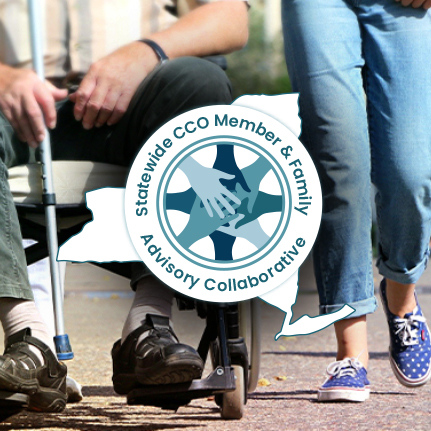
March 15
As part of #DDAwareness month, we’re calling on you to help recognize the creative and caring people that support people with #DevelopmentalDisabilities. #Advocates for people with DD are calling on Governor #KathyHochul to make a permanent wage increase for Direct Support Professionals (DSPs), to help with the current staffing crisis. Senator John Mannion has supported the cause, saying, “Families across New York are counting on these services for their loved ones—better pay will be critical to recruit and retain workers and help stave off facility and program closures.”
Read the full article and tell your legislators to #RaiseTheirWageNow with our one-click platform.
March 18
Today is Preschool Teacher Recognition Day! We would like to thank all of the hardworking preschool teachers who have approached the challenges of the last two years with dedication, creativity, and optimism. Springbrook’s Kids Unlimited Preschool are a nurturing bunch, devoted to the details to ensure that each student has access to a curriculum that works best for them. Traci Lanner, director of the School at Springbrook, shared these kind words with us:

“Our preschool teachers are mentors, playmates, artists, and nurturers just to name a few of their roles. Their flexibility and commitment to the children throughout the pandemic has allowed young minds to learn, grow, and succeed in their early educational experiences in spite of the special precautions and mandates we’ve had to adhere to for the past two years. I am grateful for the work they do each day serving the community and fulfilling Springbrook’s mission.”
What makes Kids Unlimited Preschool at Springbrook so unique is the accessibility of programs that have been designed with every child in mind. At Kids Unlimited, children with and without disabilities learn side by side from both a general education teacher and a special education teacher. The teachers work together throughout the day to adapt and modify instruction and ensure the entire class has access to the curriculum. Children learn the power of acceptance, respect, and compassion as they interact with and learn from friends of all abilities. Catherine Lien, a preschool teacher at Springbrook, shares her experience working at Kids Unlimited Preschool throughout the pandemic, “The teachers have been great! We went through some difficult times, but the preschool teachers did the best we could and were amazing!”
Learn more about our Kids Unlimited Preschool program here.
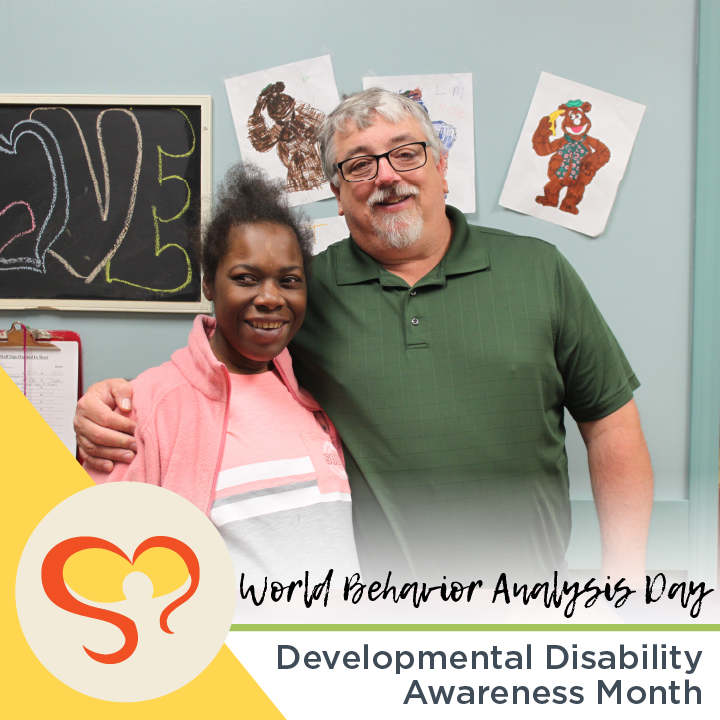
March 20
It’s Developmental Disabilities Awareness Month and this day, March 20th, marks World Behavior Analysis Day in honor of BF Skinner’s birthday, the founder of the science of behavior analysis. This day was created in December 2020 by the worldwide Associations for Behavior Analysis and highlights the work that behavior analysts do for the disability community.
Traci Lanner, director of The School at Springbrook, understood the possible applications of behavior analysis when she first learned about it as a graduate student. She told us that “applied behavior analysis (ABA) is not just an autism treatment, but an effective way to teach anyone.” Over the course of her career, she has helped to build the behavior team at Springbrook, which now consists of 14 behavior analysts and specialists, and continues to grow as staff achieve their Board Certified Behavior Analyst (BCBA) certification through the Springbrook Scholars program. These specialists, says Traci, “use positive approaches to contribute to the growth of the individuals we serve, whether it’s reducing challenging behaviors, increasing life skills, training staff, or collaborating with a treatment team.” Traci encourages everyone to learn the facts and myths about ABA and is thrilled to acknowledge World Behavior Analysis Day.
March 21
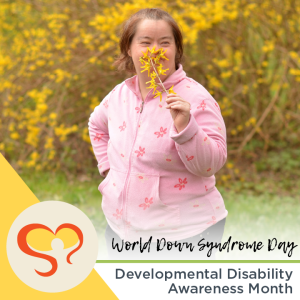 Trisomy 21, or Down Syndrome, affects the arrangement of chromosomes in the human genome and occurs naturally in about 1 of every 1000 to 1 in 1,100 around the world. People with down syndrome are affected differently, but by meeting all of their individual needs through monitoring physical and mental health, and utilizing therapies like physiotherapy, speech therapy, and occupational therapy, as well as counselling, they can live full lives as participants in the community. To join the campaign for awareness, #LotsOfSocks, on World Down Syndrome Day wear your most colorful socks, a mismatched pair, or multiple pairs of socks! It’s also important to share stories, experience, and knowledge, and advocate on behalf of yourself, a friend, or a family member with down syndrome on this day and every day!
Trisomy 21, or Down Syndrome, affects the arrangement of chromosomes in the human genome and occurs naturally in about 1 of every 1000 to 1 in 1,100 around the world. People with down syndrome are affected differently, but by meeting all of their individual needs through monitoring physical and mental health, and utilizing therapies like physiotherapy, speech therapy, and occupational therapy, as well as counselling, they can live full lives as participants in the community. To join the campaign for awareness, #LotsOfSocks, on World Down Syndrome Day wear your most colorful socks, a mismatched pair, or multiple pairs of socks! It’s also important to share stories, experience, and knowledge, and advocate on behalf of yourself, a friend, or a family member with down syndrome on this day and every day!
Click here for more information on World Down Syndrome Day!
Click here for more information on the #LotsOfSocks Campaign!
March 26
In o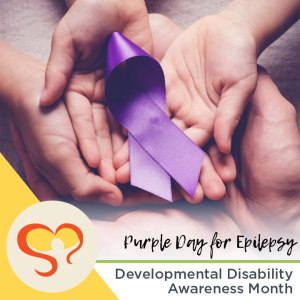 bservance of Purple Day, for epilepsy awareness on Saturday, March 26th, you can show your support by wearing the color purple. On March 26th, events are hosted around the world to generate awareness of epilepsy conditions and to support those with epilepsy and their loved ones. Epilepsy, also known as seizure disorder, is a neurological condition that affects approximately 3.4 million people worldwide. There are three different classifications of seizures, which each effect the nervous system in different ways, and have many more triggers. Epilepsy can develop at any time over the course a person’s lifespan and six out of ten people will often have no known cause for their seizure disorder.
bservance of Purple Day, for epilepsy awareness on Saturday, March 26th, you can show your support by wearing the color purple. On March 26th, events are hosted around the world to generate awareness of epilepsy conditions and to support those with epilepsy and their loved ones. Epilepsy, also known as seizure disorder, is a neurological condition that affects approximately 3.4 million people worldwide. There are three different classifications of seizures, which each effect the nervous system in different ways, and have many more triggers. Epilepsy can develop at any time over the course a person’s lifespan and six out of ten people will often have no known cause for their seizure disorder.
For more information on Purple Day and to learn more about epilepsy, you can visit this link here.

